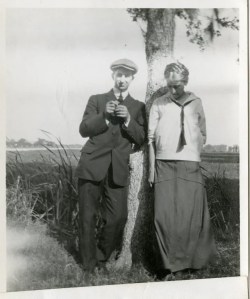It can take me a long time to recognize something wonderful right in front of me, even as I blame my troubles on lacking some item of little value.
One such under-appreciated gem is Radoslav Tsanoff. His Humanities 100 course opened new doors for my understanding of philosophy, but I’ve only recently come to fully appreciate that opportunity.

Tsanoff’s bio
Radoslav Tsanoff was born in Sofia, Bulgaria. Coming to the US at age 16 to study at Oberlin, he received his PhD in philosophy at Cornell. He became the first professor of philosophy at Rice in 1914 and went on to become a brilliant teacher who inspired generations of students. He was a noted authority on intellectual history and author of many excellent books.
After a five-year retirement, Radoslav returned as Professor of Humanities, before retiring for the second time in 1974. He won many awards. With his wife Corinne, he was an active supporter of music and arts in Houston. He was religious and politically liberal, but not a member of any church or political party. He died just two months after Corinne died.
I recall that Radoslav donated his time, teaching for $1 a year. He would carefully empty his satchel at Fondren Library to allow the student at the door to check that he wasn’t stealing any books. In her excellent blog on Rice history, Melissa Kean tells many fascinating stories about the Tsanoff’s.

Guiding principles
Radoslav’s close colleague says this about the couple:
They know what makes life worth living…. [Their happiness] comes from their enthusiasm for things life has to offer…. their wisdom consists in their constantly drawing on the great wealth contained in the achievements of the human spirit––in science, letters, and art, in the beauty of nature, and in the deep satisfaction that comes with working with other people toward common goals….
They throw themselves resolutely and devotedly into these boundless realms of value, try to assimilate, absorb, and enjoy them, and then do all they can to make these values patent and accessible to others…. The result is that magic we sense when we were in their presence.
Konnie Kolenda, speaking at an event honoring Radoslav and Corinne Stephenson Tsanoff, 1973; document recovered by Melissa Kean
Revisiting The Great Philosophers
Radoslav’s own The Great Philosophers was the text for Humanities 100. It’s scholarly, yet very readable, a bridge between popular discussions of philosophy as one might find in a good magazine and detailed, technical analyses found in a philosophy journal.
Recently, I’ve been having weekly discussions with an 88 year old friend. He’s a former shop teacher, who never took a philosophy course. We’ve read various short selections, including blog posts, entries in the Stanford Encyclopedia of Philosophy, and other sources. But we’ve settled on The Great Philosophers, as a book offering plenty of substance in an accessible form.
Re-reading that book has renewed my appreciation of Radoslav Tsanoff. His discussions of various issues are enlightening still, 70 years after the book was written and 55 years after I first read it. Among other things, he has interesting commentary on Epicurus and Spinoza, whose stars have risen anew since 1953. His capsule summary of pragmatism, especially of James and Dewey seems more prescient than that found in similar books.
Dreamers and doers
In an essay for Humanities 100, I included a New Yorker cartoon. I can’t find a copy of that essay, or of the cartoon, but I recall it showing two bums slouching in an alleyway. One says, “There are the dreamers and there are the doers. I’m a dreamer.”
Radoslav said that it was the only illustrated student essay that he ever received. I’m not sure, but I think that was a compliment. I know that he illustrated his own lectures with verbal images of works of art and architecture, cityscapes, and scenes from nature.
He also reminded me that one can’t always be just a dreamer; that life means engagement with ideas, arts, nature, and community.
His own life exemplified both dreaming and doing. Perhaps that’s why the last chapter emphasized philosophical pragmatism.
It’s worth quoting from the final paragraph, written 70 years ago. Many people might assume he’s talking about our own age:
Ours is a transitional age, and unsettled in its thinking, and in its social structure, facing exceedingly grave perils, yet having the possibility of unprecedentedly rich fruition…. Philosophy disposes only of its routine tasks. Its major inquiries may become more enlightened, but they cannot be terminated. This is not a skeptical reflection. It signifies, not that philosophical thought is futile, but that it is inexhaustible.
p. 573
